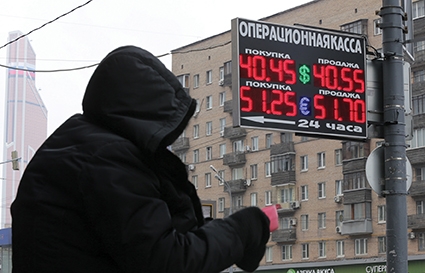Russian Economy Minister: Let’s Dump the Ruble
Last week, the head of the Russian Ministry of Economic Development, Maxim Oreshkin, said during a press conference that it is more profitable for Russians to buy foreign currency. The forecast for the average dollar exchange rate for 2017 is 64.4 Rubles, but by the end of the year it is expected to grow to 68 Rubles. As a result, many citizens have become preoccupied with buying currency, not only those that are going abroad this summer.
A recommendation to buy assets can be given by any analyst of a private financial company or by banks that manages assets in the stock or bond market. He risks only his reputation: his priority is the profit of his clients. However, the Minister of Economy is a governor, his salary is paid from the budget, not from the income of a private financial company operating at its own risk. He is supposed to recommend to his fellow citizens domestic tourism and Ruble deposits; to invest their savings in shares of Sberbank, Norilsk Nickel, MTS, Lukoil or Surgutneftegaz, and not to buy foreign currency. Active PR of the Russian Ruble and the Russian capital market in the 1990s was very well done, even by such a liberal “Westerner” as Anatoly Chubais.
Apparently, those who believe that patriotism and the modern liberal economic blocs are different are right. People come and go, but basically nothing changes. Orientation to the West and, above all, the US for Russian ministers is formatted in the brain.
The only problem is that Russia needs a strong Ruble. And this question is more political than economic. The fate of Eurasian integration largely depends on whether the Russian currency is strong or weak. First of all, it will be determined by the attitude to Russia of people in the former Soviet republics and neighboring states. At the same time, modern nations are completely bourgeois, personal financial interests, comfort and quality of life are always placed first and foremost. Therefore, Russia will be attractive for Eurasian integration if and only if dollar salaries and other incomes are much higher than that of its neighbors and potential partners for integration- when Moscow, not only in words, but in fact, becomes an international financial center, when it is much more profitable to live and work in Russia, and not in Belarus, Kazakhstan, etc. And this requires a very strong Ruble. Of course, a strong Ruble hits Russian import competitors, exporters and partially the budget. However, the geopolitical poles from a strong Ruble outweigh all the economic disadvantages.
There are a lot of leverages to maintaining a stable Ruble rate. Russia's international reserves are about $400 billion. And the patriotic, and completely loyal to the Kremlin, Surgutneftegaz holds a cash pillow in currency of more than $36 billion. Other export companies have a good stash, not to mention the private offshore aristocracy, whose aggregate foreign exchange assets are estimated at $1.3 trillion.
The issue is in the political decision and political will. Of course, coming from the Kremlin, and not from the Ministry of Economic Development.
Dimitri Dolaberidze











